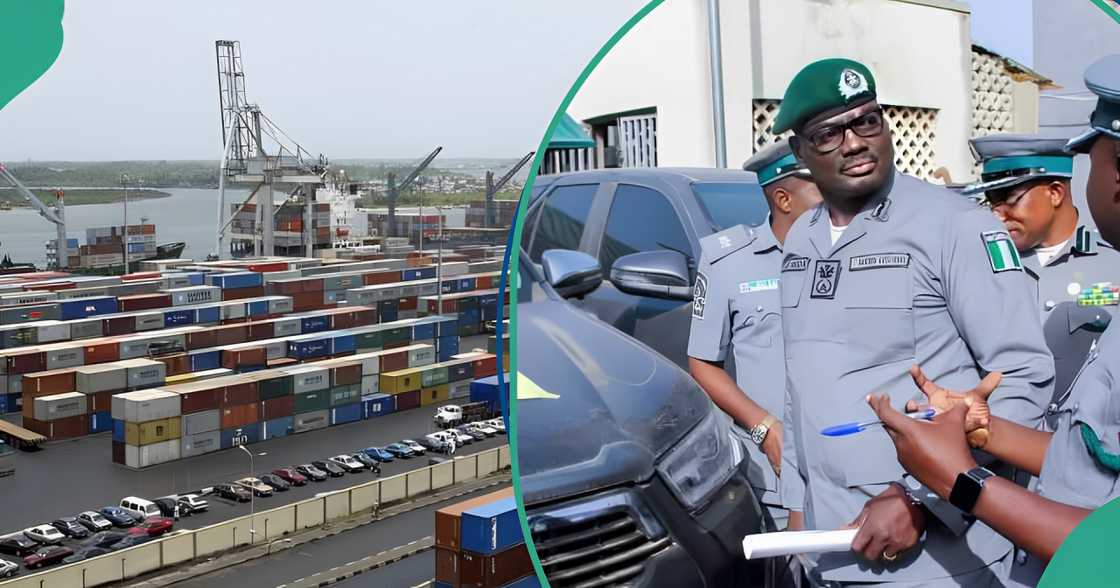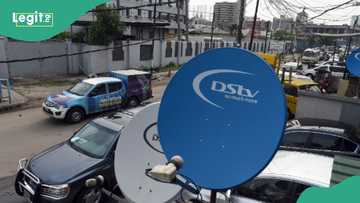Cost of Cars, Phones, and Imports to Spike as Customs Enforces 4% FOB Levy
- The Nigeria Customs Service (NCS) has begun charging the controversial 4% Free On Board (FOB) levy on all imports
- The new charge, which began on Monday, August 4, 2025, replaces the 1% Comprehensive Import Supervision Scheme (CISS)
- The new charge has received knocks from importers and Nigerians who see it as an unnecessary burden, which may spike inflation
Legit.ng’s Pascal Oparada has reported on tech, energy, stocks, investment and the economy for over a decade.
The Nigeria Customs Service (NCS) has quietly implemented a controversial 4% Free On Board (FOB) levy on all imports, replacing the former 1% Comprehensive Import Supervision Scheme (CISS).
The new charge, which officially began on Monday, August 4, 2025, applies to the value of goods plus the cost of transportation to the port of loading.

Source: Getty Images
New levy replaces 1% import supervision fee
This move comes months after the levy was first proposed in February 2025 and later suspended due to strong public opposition.
After further stakeholder consultations and guidance from the House of Representatives Committee on Customs, the NCS has now gone ahead with the implementation.
Stakeholders react to the sudden introduction
Many freight forwarders and clearing agents say the new levy was introduced into the cargo clearance system without adequate notice. This surprise rollout has triggered confusion and concern, with agents noticing sudden spikes in import duties.
A clearing agent, Subairu Abdul, said he was shocked when the duty on his consignment jumped from ₦7 million to ₦10 million between Friday and Monday. “It is true. The 4% FOB has been introduced,” he confirmed.
Why Customs say the change was necessary
Another freight forwarder, Comrade Joy Onome Monije, noted that the 7% surcharge — which the CGC previously promised to scrap — still appears on the Customs portal. “Some said it’s been reintroduced. But I need to confirm before making a valid comment,” she added.
Comptroller General of Customs, Adewale Adeniyi, explained that the 4% FOB levy is part of a broader plan to modernise Customs operations and fund the new indigenous B’Odogwu trade platform.
Adeniyi noted that the previous 1% CISS had helped fund key reforms but that the shift to more technology-driven systems requires deeper investment.
The Customs boss, who also chairs the World Customs Organisation (WCO), appealed for understanding from the business community, noting that the modernisation is aimed at improving clearance times and service delivery.
Customs Act 2023 backs new charges
Legal backing for the new levy stems from Part V, Section 18 of the Customs Act 2023, which mandates the NCS to collect not less than 4% of the FOB value of imports into designated accounts.
It also allows for future increments subject to approval by the National Assembly.

Source: Getty Images
According to Dr. Eugene Nweke, founder of Sea Empowerment and Research Centre (SEREC), the law also emphasises transparency in determining tariff regimes and user fees.

Read also
2025 recruitment: Immigration, NSCDC, Others, extend application deadline, CDCFIB announces new date
“The 4% FOB establishes a minimum revenue stream for the NCS, with provisions for upward adjustments,” he stated.
Implications for the Nigerian Economy and Consumers
Importers warn that the new levy will drive up the cost of vehicles, electronics, industrial equipment, and even everyday items like smartphones.
The Manufacturers Association of Nigeria (MAN) has also voiced concern, saying the levy could have a “catastrophic impact” on the business environment and general cost of living.
They argue that the government should instead focus on easing trade bottlenecks, improving port efficiency, and strengthening the naira to support manufacturing and trade competitiveness.
With inflation already biting, many fear the 4% FOB levy will worsen the cost-of-living crisis, putting pressure on both businesses and consumers alike.
CBN slashes exchange rate to clear goods
Legit.ng earlier reported that the Nigeria Customs Service has adjusted the exchange rate for calculating import duties at the nation's seaports and airports.
Data obtained from the federal government trading portal showed that as of Sunday, June 15, 2025, importers will be charged N1,548.85 per dollar for import duty.
The new rate represents a 0.24% reduction from the previous rate of N1,552.61 per dollar on Sunday, June 8.
Source: Legit.ng





